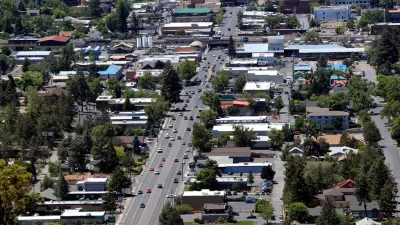The state made sweeping reforms that eliminate parking requirements in some jurisdictions, which supporters hope will lead to faster, less expensive construction and the revitalization of vacant properties and underused lots.

Writing in Sightline, Michael Andersen and Catie Gould ponder the potential impacts of Oregon’s historic parking reform legislation. “The law in question gives the state board the power to set land use rules that, among other things, ‘minimize adverse social, economic, and environmental impacts and costs.’”
The law makes parking optional in many of the state’s jurisdictions. “In some situations—within a half-mile of relatively frequent transit, for homes of 750 square feet or less, and for homes meeting affordability targets—minimum parking mandates will no longer apply for jurisdictions within Oregon’s eight largest metro areas.” Communities farther from transit are tasked with finding other ways to reduce car dependence. “The commission did decide to give the Portland metro area a bit of additional flexibility. Its regional government is allowed to come up with its own parking rules, but the state commission must sign off that they are at worst equivalent to the statewide rules.”
The law isn’t without its detractors, but, “assuming these new rules survive legal challenge, people looking to build new homes and businesses, or dreaming of renovating an older building, can look forward to deciding for themselves how much parking their property needs.”
The article lists five ways the new rules might change Oregon’s landscape:
- Increased reuse of vacant buildings
- Sharing of underused parking lots
- Faster construction
- Improved management of on-street parking and curb space
In the fifth item, the article warns not to expect too much: “Despite all this, the Oregon of 2032 will probably have more parking spaces than the Oregon of 2022. The new rules put a few new costs and limits on the size of new lots and garages but mostly just within designated ‘climate-friendly areas.’” The authors note that it will take more—infrastructure improvements, better public transit, and affordable housing near transit and businesses—to reduce the need and desire for parking in the city.
FULL STORY: OREGON JUST SLASHED PARKING MANDATES. 5 THINGS THAT MIGHT HAPPEN NEXT

Planetizen Federal Action Tracker
A weekly monitor of how Trump’s orders and actions are impacting planners and planning in America.

San Francisco's School District Spent $105M To Build Affordable Housing for Teachers — And That's Just the Beginning
SFUSD joins a growing list of school districts using their land holdings to address housing affordability challenges faced by their own employees.

The Tiny, Adorable $7,000 Car Turning Japan Onto EVs
The single seat Mibot charges from a regular plug as quickly as an iPad, and is about half the price of an average EV.

With Protected Lanes, 460% More People Commute by Bike
For those needing more ammo, more data proving what we already knew is here.

In More Metros Than You’d Think, Suburbs are Now More Expensive Than the City
If you're moving to the burbs to save on square footage, data shows you should think again.

The States Losing Rural Delivery Rooms at an Alarming Pace
In some states, as few as 9% of rural hospitals still deliver babies. As a result, rising pre-term births, no adequate pre-term care and "harrowing" close calls are a growing reality.
Urban Design for Planners 1: Software Tools
This six-course series explores essential urban design concepts using open source software and equips planners with the tools they need to participate fully in the urban design process.
Planning for Universal Design
Learn the tools for implementing Universal Design in planning regulations.
Smith Gee Studio
City of Charlotte
City of Camden Redevelopment Agency
City of Astoria
Transportation Research & Education Center (TREC) at Portland State University
US High Speed Rail Association
City of Camden Redevelopment Agency
Municipality of Princeton (NJ)





























